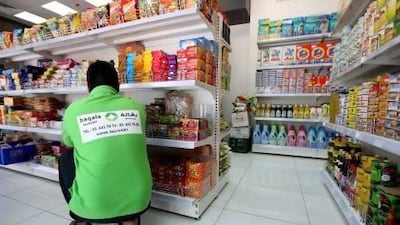ABU DHABI //The bad news is, hundreds of small grocery shops that failed to comply with new standards have closed down.
The good news is that consumers and shopkeepers alike are hailing the new-look baqala groceries as a breath of fresh air – in some cases, quite literally.
"Everything is new – new fridge, new freezer, new shelves. I like it," said Abdul Muneer, from India, who was doing a brisk trade at his Abu Sultan baqala in the Tanker Mai area of Abu Dhabi.
The shop reopened a month ago after four months and Dh150,000 of work, including an extension. "Before, I had one door, now, I have two doors. I have space for a lot of shelves. Customers like it."
Shops were originally given a January 1 deadline by Abu Dhabi Food Control Authority to meet the new baqala requirements, which include better refrigeration, shelving and decor.
A stay of execution was granted when the registration deadline was extended until March 6, and shops had until today for the work to be completed.
Mr Muneer was unable to do the work in time for the first deadline because of a financial problem.
"It was good to have time because I saved money and it was not rushed," he said. Trade, he says, has increased since the refurbishment.
Finishing touches were being applied last week in the Dh60,000 makeover at the nearby Abdualrahman Musan Supermarket in Tanker Mai.
"I opened it three years ago so I just had to change the floor and the ceiling and add CCTV. Now there is more space because the shelves have been organised," said Hanif Abdulrahman, 24, from India, whose father owns the business.
The shop closed at the end of last year because the changes had not been made in time for the first deadline. Mr Abdulrahman heard about the extension when travelling.
"I am happy because if they did not give the new deadline, I would not be here," he said. The work took two months to complete and the shop reopened last Sunday.
Sulaiman Mahmood, manager of Warsam baqala, has a new uniform along with other staff at the new-look shop, also in Tanker Mai.
It closed from December to May for the work, which included an extension.
Customer Moad Ahmed, 28, from Jordan, is pleased with the result. "I like the changes. It's better. I'm glad that they brought in the new standards," he said.
"Customers like the new store," said Shareef Moosa, from India, who works at Blue Ruby near Muroor Road. It opened in February after a Dh110,000 refurbishment that took two months.
"There were six groceries in the area but now there are two," he said.
The Food Control Authority said last month that 71 per cent of groceries had made renovations or applied to do so. Now that the final deadline has passed, there will be a survey to establish how many groceries had been upgraded.
"The groceries that have failed to upgrade will go out of business. This was made amply clear right at the beginning," said Mohamed Jalal Al Rayssi, spokesman for the joint committee of Abu Dhabi government bodies overseeing the grocery upgrade programme.
"The rules that apply to businesses without proper licences and documents will apply to the groceries that function beyond the deadline of June 30 without implementing the necessary changes," he said.
Mr Al Rayssi said the committee was happy with the new-look groceries and the changes brought about in the retail sector, in terms of business dynamics, visual appeal and customer friendliness.
"We will not be exaggerating when we say groceries have now been brought on par with the best anywhere in the world," he said. "They are now run more professionally, the consumers are better protected and they look much more elegant, clean and appealing."
The changes were aimed at bringing benefits to consumers, owners, operators and neighbourhoods, Mr Al Rayssi said.
"The groceries in the emirate functioned for decades in the old mould without making any changes, discomfiting the consumers on the one hand and raising serious questions of food safety on the other. This had to change."
More companies and other types of supermarkets are also expected to open soon.
"It is an attractive business sector and the changes have made it much more attractive. We are confident the groceries sector will see the arrival of many new players in the next few months," Mr Al Rayssi said.
ecleland@thenational.ae

